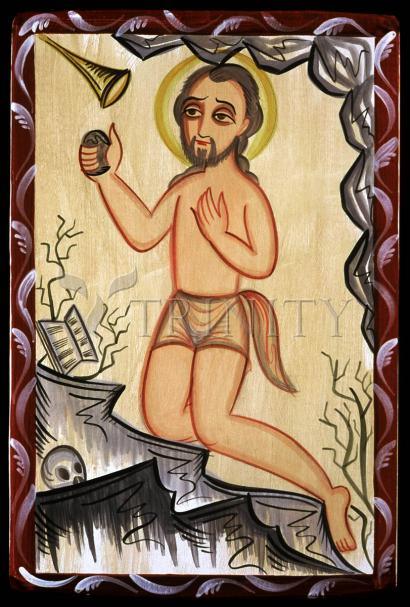Collection: St. Jerome
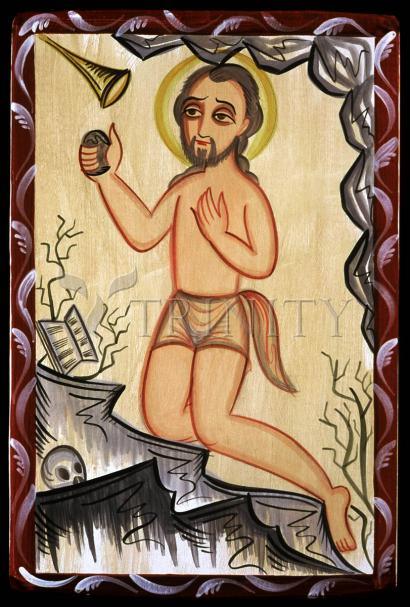
-
Sale
Wood Plaque Premium
Regular price From $99.95 USDRegular priceUnit price per$111.06 USDSale price From $99.95 USDSale -
Sale
Wood Plaque
Regular price From $34.95 USDRegular priceUnit price per$38.83 USDSale price From $34.95 USDSale -
Sale
Giclée Print
Regular price From $19.95 USDRegular priceUnit price per$22.17 USDSale price From $19.95 USDSale -
Custom Text Note Card
Regular price From $300.00 USDRegular priceUnit price per$333.33 USDSale price From $300.00 USDSale -
Sale
Wall Frame Espresso
Regular price From $139.95 USDRegular priceUnit price per$155.50 USDSale price From $139.95 USDSale -
Sale
Wall Frame Gold
Regular price From $139.95 USDRegular priceUnit price per$155.50 USDSale price From $139.95 USDSale -
Sale
Wall Frame Black
Regular price From $139.95 USDRegular priceUnit price per$155.50 USDSale price From $139.95 USDSale -
Sale
Canvas Print
Regular price From $84.95 USDRegular priceUnit price per$94.39 USDSale price From $84.95 USDSale -
Sale
Acrylic Print
Regular price From $114.95 USDRegular priceUnit price per$127.72 USDSale price From $114.95 USDSale -
Sale
Metal Print
Regular price From $114.95 USDRegular priceUnit price per$127.72 USDSale price From $114.95 USDSale
ARTIST: Br. Arturo Olivas, OFS
ARTWORK NARRATIVE:
San Geronimo was a 4th century scholar, monk, and hermit. After many years of travel, scholarship, and study Geronimo finally settled in Bethlehem where he translated the Bible from Greek and Hebrew to Latin. This translation of the Bible became known as the famous Vulgate Bible. In Jerusalem Geronimo guided the order of nuns founded by St Paula. Geronimo is often depicted in sacred art performing penance in a cave with a lion at his feet. Sometimes the trumpet of God hovers nearby.
In New Mexico the 17th century Spanish missionaries named a church in honor of the saint at the native pueblo of Taos. San Geronimo is one of the patrons of Spanish soldiers who shout his name when charging into battle. He is also patron of children, orphans, and protects against lightning.
His feast day is September 30.
- Art Collection:
-
Saints & Angels
- Patronage:
-
Translators,
-
Students,
-
Spanish Soldiers,
-
Schoolchildren,
-
Orphans,
-
Lightning,
-
Librarians,
-
Bible Scholars,
-
Archivists,
-
Archeologists
Jerome was born to a rich pagan family, he led a misspent youth. He studied in Rome and became a lawyer. He converted in theory, and was baptised in 365, wherein he began his study of theology, and had a true conversion. He was a monk. Jerome lived for years as a hermit in the Syrian deserts. He wasa reported to have drawn a thorn from a lion's paw; the animal stayed loyally at his side for years. Jerome was a priest and student of Saint Gregory of Nazianzen. He was secretary to Pope Damasus who commissioned him to revise the Latin text of the Bible.
The result of his 30 years of work was the Vulgate translation, which is still in use. Jerome was friend and teacher of Saint Paula, Saint Marcella, and Saint Eustochium, an association that led to so much gossip, Jerome left Rome to return to the desert solitude. He lived his last 34 years in the Holy Land as a semi-recluse. Jerome wrote translations of Origen, histories, biographies, and much more. He was a Doctor of the Church, Father of the Church. Since his own time, he has been associated in the popular mind with scrolls, writing, cataloging, translating, etc. This led to those who work in such fields taking him as their patron - a man who knew their lives and problems.
Born: 347 at Strido, Dalmatia
Died: 419; relics at the Basilica of Saint Mary Major in Rome
Readings:
What Jerome is ignorant of, no man has ever known.
—Saint Augustine
In the remotest part of a wild and stony desert, burnt up with the heat of the scorching sun so that it frightens even the monks that inhabit it, I seemed to myself to be in the midst of the delights and crowds of Rome. In exile and prison to which for the fear of hell I had voluntarily condemned myself, I many times imagined myself witnessing the dancing of the Roman maidens as if I had been in the midst of them: in my cold body and in my parched-up flesh, which seemed dead before its death, passion able to live. Alone with this enemy, I threw myself in spirit at the feet of Jesus, watering them with my tears, and I tamed my flesh by fasting whole weeks. I am not ashamed to disclose my temptations, but I grieve that I am not now what I then was.
—Saint Jerome's letter to St. Eustochium
The measure of our advancement in the spiritual life should be taken from the progress we make in the virtue of mortification; for it should be held as certain that the greater violence we shall do ourselves in mortification, the greater advance we shall make in perfection.
—Saint Jerome
You say in your book that while we live we are able to pray for each other, but afterwards when we have died, the prayer of no person for another can be heard... But if the apostles and martyrs while still in the body can pray for others, at a time when they ought still be solicitous about themselves, how much more will they do so after their crowns, victories, and triumphs?
—Saint Jerome from Against Vigilantius, 406AD
I interpret as I should, following the command of Christ: "Search the Scriptures," and "Seek and you shall find." For if, as Paul says, Christ is the power of God and the wisdom of God, and if the man who does not know Scripture does not know the power and wisdom of God, then ignorance of Scriptures is ignorance of Christ.
No one should think that I mean to explain the entire subject matter of this great book of the prophet Isaiah in one brief sermon, since it contains all the mysteries of the Lord. It prophesies that Emmanuel is to be born of a virgin and accomplish marvelous works and signs. It predicts his death, burial and resurrection from the dead as the Savior of all men. Whatever is proper to holy Scripture, whatever can be expressed in human language and understood by the human mind, is contained in the book of Isaiah.
—Saint Jerome: from a commentary on Isaiah
Additional Items Our Customers Like
-
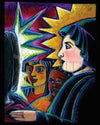
St. Elizabeth Ann Seton (by Br. Mickey McGrath, OSFS)
-

St. Elizabeth Ann Seton (by Br. Mickey McGrath, OSFS)
-
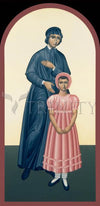
St. Elizabeth Ann Seton (by Br. Robert Lentz, OFM)
-
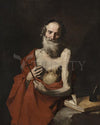
St. Jerome (by Museum Religious Art Classics)
-
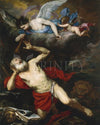
St. Jerome in the Wilderness (by Museum Religious Art Classics)
-
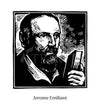
St. Jerome Emiliani (by Julie Lonneman)



